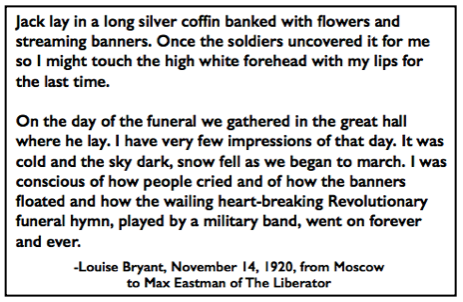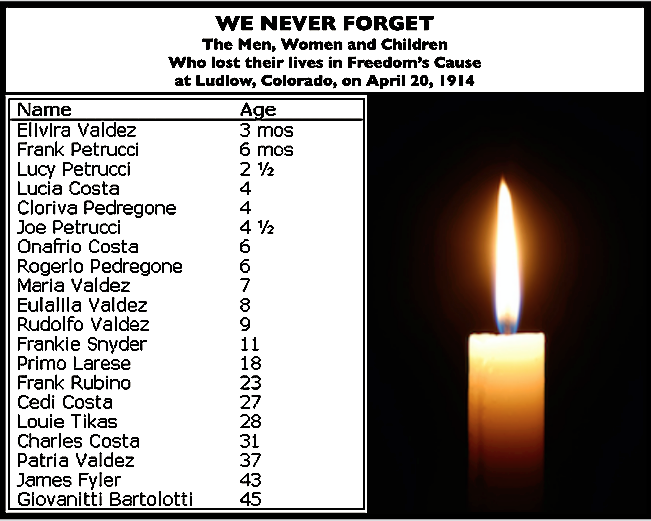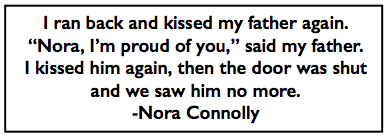 —————
—————
Hellraisers Journal – Monday September 19, 1921
Photo Shows Big Bill Haywood at Unveiling of John Reed Memorial in Moscow
From the Oregon Sunday Journal of September 18, 1921:
From The Liberator of September 1921:
 —————
—————
Hellraisers Journal – Monday September 19, 1921
Photo Shows Big Bill Haywood at Unveiling of John Reed Memorial in Moscow
From the Oregon Sunday Journal of September 18, 1921:
From The Liberator of September 1921:
 ———-
———-
Hellraisers Journal – Thursday February 3, 1921
Louise Bryant Writes from Moscow on Death of John Reed
From The Liberator of February 1921:
Last Days With John Reed
A Letter from Louise Bryant
Moscow, Nov. 14, 1920
Dear Max:
I knew you would want details and a story for the Liberator–but I did not have either the strength or the courage. As it is–I will be able to write only a very incoherent letter and you may take from it what you wish. Jack’s death and my strenuous underground trip to Russia and the weeks of terror in the typhus hospital have quite broken me. At the funeral I suffered a very severe heart attack which by the merest scratch I survived. Specialists have agreed that I have strained my heart because of the long days and nights I watched beside Jack’s bed and that it is enlarged and may not get ever well again. They do not agree, however, on the time it will take for another attack. I write to you all these stupid things because I have to face them myself and because it must be part of the letter. The American and German doctors give me a year or even two, the Russians only months. I have to take stimulants and I am not in a bit of pain. I think I have better recuperative powers than they believe–but, anyway, it is a small matter. I once promised Jack that I would put all his works in order in case of his death. I will come home if I get stronger and do so.
All that I write now seems part of a dream. I am in no pain at all and I find it impossible to believe that Jack is dead or that he will not come in this very room any moment.
Jack was ill twenty days. Only two nights, when he was calmer, did I even lie down. Spotted typhus is beyond description, the patient wastes to nothing under your eyes.
But I must go back to tell you how I found Jack after my illegal journey across the world. I had to skirt Finland, sail twelve days in the Arctic ocean, hide in a fisherman’s shack four days to avoid the police with a Finnish officer and a German, both under sentence of death in their own countries. When I did reach Soviet territory I was at the opposite end of Russia from Jack. When I reached Moscow he was in Baku at the Oriental Congress. Civil war raged in the Ukraine. A military wire reached him and he came back in an armored train. On the morning of September 15th he ran shouting into my room. A month later he was dead.
 ———-
———-
Hellraisers Journal – Wednesday December 8, 1920
Max Eastman: “John Reed sacrificed a life to the revolution…”
From The Liberator of December 1920
-“Fog” by John Reed:
———-
JOHN REED
[-from Speech by Max Eastman.]
WE have been reading in the great newspapers of this city the last few days very appreciative accounts of the life and character of John Reed. They have permitted themselves to admire his courage and honesty and the great spirit of humorous adventure that was in him. They permit themselves to admire him in spite of the fact that he died an outlaw and a man wanted by the police as a criminal. They admire him because he is dead. But we speak to a dIfferent purpose. We pay our tribute to John Reed because he was an outlaw. We do not have to examine the indictment, or find out what special poison the hounds of the Attorney-General had on their teeth against John Reed. We know what his crime was-it is the oldest in all the codes of history, the crime of fighting loyalty to the slaves. And we pay our tribute to him now that he lies dead, only exactly as we used to pay it when he stood here making us laugh and feel brave, because he was so full of brave laughter. Our tribute to John Reed is a pledge that the cause he died for shall live.
 ———-
———-
Hellraisers Journal – Monday November 1, 1920
Moscow, Russia – John Reed Died at His Post on October 17th
From The Liberator of November 1920:
 ———-
———-
Hellraisers Journal – Sunday October 31, 1920
Moscow, Russia – Great Funeral Demonstration Panned for John Reed
From the Cleveland Toiler of October 30, 1920:
John Reed Is Dead
By Robert Minor.
The Tzar Nicholas once complained that he was unable to have the best of Russian music because, unfortunately, the best composers were guilty of the crime of sedition and he could not encourage them.
Today the Tzar Nicholas lies in a hole in the ground of a Siberian village, and the sweetest music of Russia is played in his palace to the ears of the plain workingmen for whom the composers really wrote their music anyway.
In Moscow there died the other day a great American literary artist, John Reed. He was a young man, only thirty-three, and already known about the earth as one of the finest of American artists.
John Reed began his career ten years ago as a reporter for the New York World and for the New York Tribune. He did well. Very soon he graduated from the ranks of daily reporters and was acknowledged as one of the most brilliant writers on the high-priced magazines that spend their thousands to get the best of writing.
 ———-
———-
Hellraisers Journal – Tuesday October 19, 1920
Moscow, Russia – John Reed Has Died of Typhus, According to Cable
From The Butte Daily Bulletin of October 18, 1920:
JOHN REED DlES IN MOSCOW SAYS CABLE
—————
Well Known American Radical Writer and Editor
Succumbs to Typhus, According to Message.
——-(Special United Press Wire.)
Portland, Ore., Oct. 18.-John Reed, well known radical writer and editor, died Sunday at Moscow, Russia, according to cablegrams received by his relatives here. Typhus was the cause.
Reed spent considerable time in Russia as a war correspondent and writer for magazines. He had been previously on the staff of the American magazine. He returned to the United States after the war with a commission as Soviet ambassador to the United States, but his commission was later recalled.
——-
Reed’s commission as ambassador to the United States was refused recognition by the state department.
An address by Reed recently delivered in Moscow was widely quoted in the press of the United States and Europe within the last two weeks. In his address Reed was quoted as declaring that the workers in the United States and Europe were in favor of recognition of the Soviet republic, but that the opposition to such recognition was being fostered by reactionary interests connected with the international financial interests.
—————
[Emphasis added; Newsclip added from Utah’s Ogden Standard of February 19, 1918.]
 ———-
———-
 ———
———
Sept 15, 1913 – Trinidad, Colorado
Convention of District 15 of the United Mine Workers of America
The delegates opened their convention by singing The Battle Cry of Union:
We will win the fight today, boys,
We’ll win the fight today,
Shouting the Battle Cry of Union;
We will rally from the coal mines,
We’ll fight them to the end,
Shouting the Battle Cry of Union.
The Union forever, hurrah boys, hurrah!
Down with the Baldwins and up with the law;
For we’re coming, Colorado, we’re coming all the way,
Shouting the Battle Cry of Union.
The miners faced the grim prospect of going out on strike against the powerful southern coalfield companies, chief among them, John D Rockefeller’s Colorado Fuel and Iron Company. The coal operators had steadfastly refused to recognize the Union and had ignored all attempts at negotiation.
The miners had had their fill of dangerous working conditions, crooked checkweighmen, long hours, and low pay. They lived in peonage in company towns, were paid in company scrip, and were forced to shop for their daily needs in high-priced company stores which kept them always in debt. But, mostly they hated the notorious company guard system. Every attempt to organize had been met with brutality on the part of the coal operators.
Mother Jones addressed the convention for over an hour, urging the men to:
Rise up and strike! …Strike and stay with it as we did in West Virginia. We are going to stay here in Southern Colorado until the banner of industrial freedom floats over every coal mine. We are going to stand together and never surrender…
Pledge to yourselves in this convention to stand as one solid army against the foes of human labor. Think of the thousands who are killed every year and there is no redress for it. We will fight until the mines are made secure and human life valued more than props. Look things in the face. Don’t fear a governor; don’t fear anybody…You are the biggest part of the population in the state. You create its wealth, so I say, “Let the fight go on; if nobody else will keep on, I will.”
 ———-
———-
Hellraisers Journal – Monday May 19, 1919
Eugene Victor Debs with Head Unbent and Spirit Untamed
From the Liberator of May 1919
-by Clive Weed:
 ———-
———-
Hellraisers Journal – Sunday March 16, 1919
“The Unbroken Tradition” by Miss Nora Connolly
From the Appeal to Reason of March 15, 1919:
The Appeal Has the Literature of the
World’s New Revolutions
The Appeal Book Dept., the greatest mail order book house in the world, distributes the kind of books radicals want. For example, we are now placing particular emphasis on literature about the Irish Rebellion, the German Revolution and the Russian Revolution.
[The article goes on to describe “The German Revolution”-documents compiled by the Appeal Book Dept., and “Ten Days That Shook the World” by John Reed, offered with “The Constitution of the Russian Soviet.”]
Finally, we have the story of the Irish Rebellion by Nora Connolly. Her book is entitled “The Unbroken Tradition.” Of all the episodes that belong to the war the episode of the Irish Insurrection of 1916 is the most dramatic and the most picturesque. Here is that episode as lived through by the daughter of the Commandant of the Irish Republican Army, James Connolly. Miss Connolly’s story related with the utmost simplicity, is most moving in its human and dramatic appeal. And apart from its extraordinary interest as a narrative it gives a memorable glimpse of the Irish spirit, of the steadfast adherence of the Irish people to their ideals-what Miss Connolly called “The Unbroken Tradition.” A thrilling story thrillingly told. The Appeal Book Dept. has a large edition of this large, clothbound book, illustrated with maps and reproductions of street scenes during the revolution, and orders can be promptly filled at $1.50 per copy, postage prepaid by the Appeal.
[Photograph added.]
 ———-
———-
Hellraisers Journal – Thursday March 13, 1919
“Ten Days That Shook the World,” John Reed on the Russian Revolution
From the Appeal to Reason of March 8, 1919:
John Reed’s Latest Book Tells
Truth About Russia
“Ten days that Shook the World,” by John Reed, is the newest, and it is safe to say, the best book written about the Russian Revolution. The Appeal Book Dept., the largest mail order book house in the world, has a large stock of this new book and is ready to fill orders at once.
Do you know what occurred during the ten days of the Bolshevik Revolution in Petrograd? John Reed was there, and he will tell you if you do not know.
What did Trotzky prophesy seven days before the insurrection? John Reed knows, and his book will tell you. What was Kerensky thinking just before his government fell? John Reed had the last interview with him, and the report of this important interview is given a prominent place in “Ten Days That Shook the World.” How did the Bolsheviki make up their minds to revolt? John Reed knows what went on in the secret Bolshevik Conference of October 23, 1917, and his book tells the story accurately.
This book is a moving picture of those thrilling days in Petrograd. It is a serious attempt to tell all the details about the bolshevik coup d’ etat. It will be used as an original source by historians of the great Russian Revolution.
Can you answer these questions?
What is Bolshevism? What is the history of the Bolsheviki? Who are the cadets? What was the role of the Russian bourgeoisie in the Revolution? What kind of a governmental structure did the Bolsheviki set up? If the Bolsheviki championed the Constituent Assembly before the November Revolution, why did they disperse it by force of arms afterward? And if the bourgeoisie opposed the Constituent Assembly until the danger of Bolshevism became apparent, why did they champion it afterward?